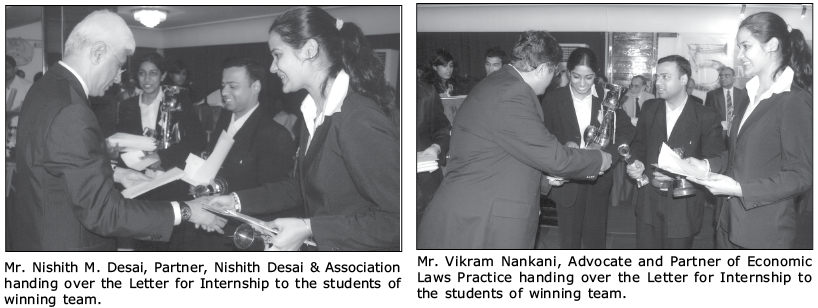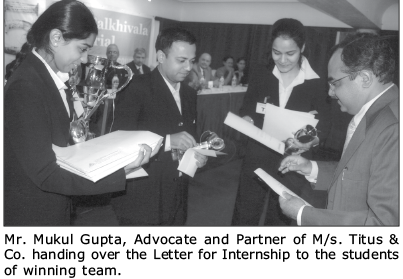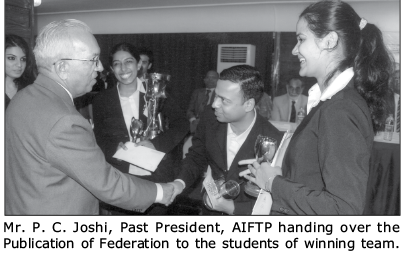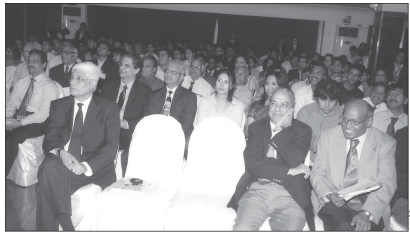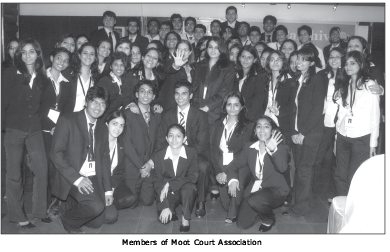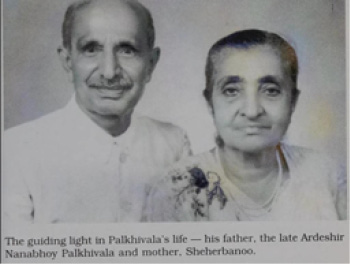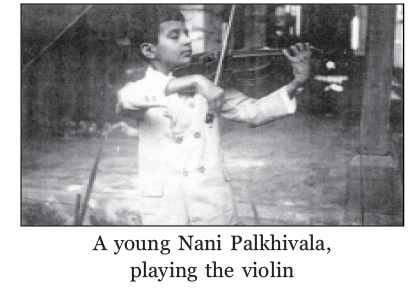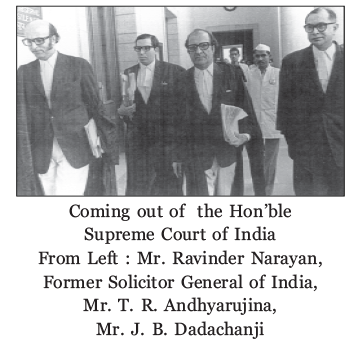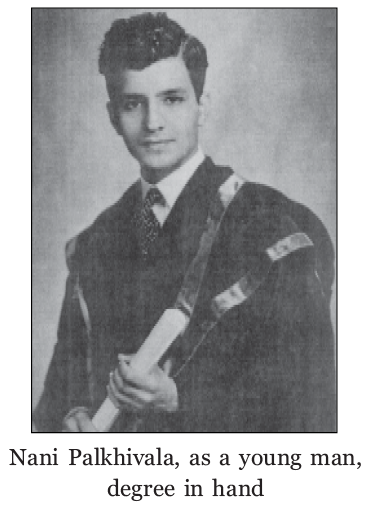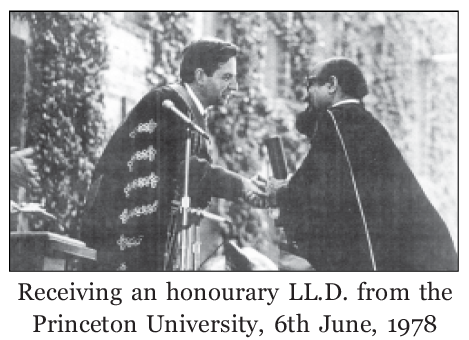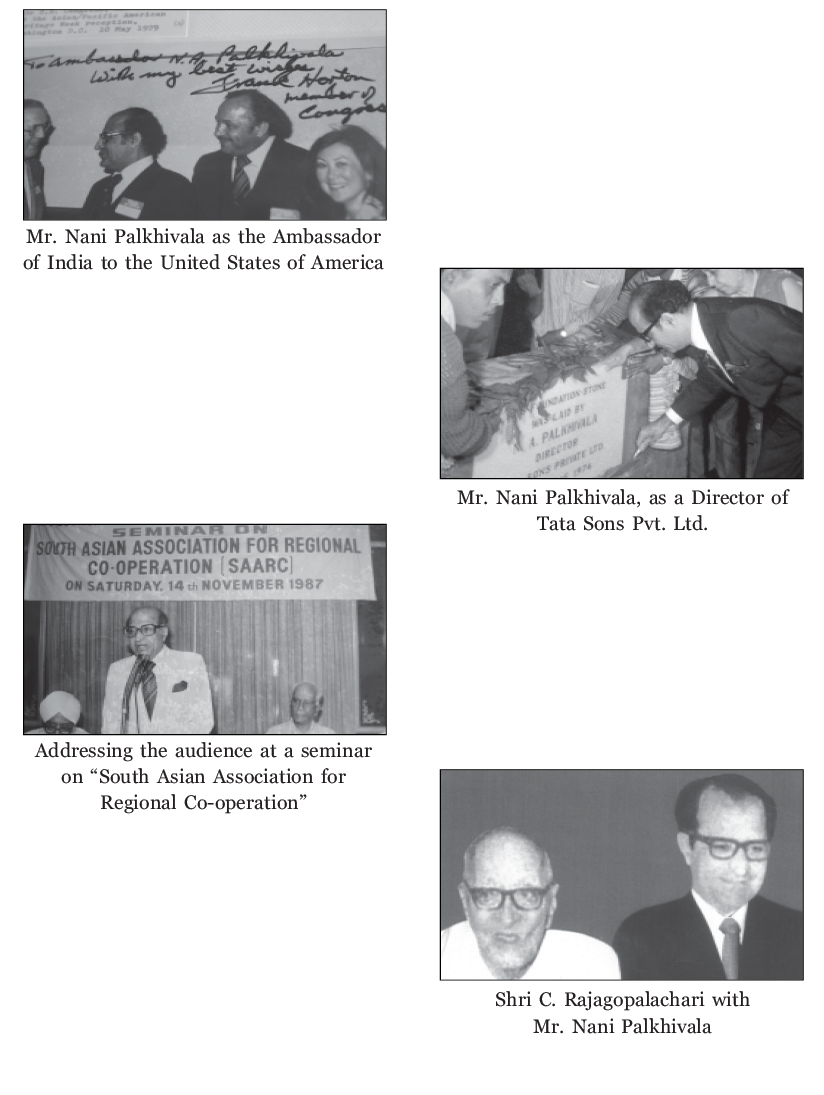The All India Federation of Tax Practitioners (AIFTP)
Inspired by the ideology to have a common platform for all those who practice taxation laws, irrespective of their individual affiliations and to enable them to share the benefits of their learning and sharing of knowledge, eminent professionals from the fields of Direct and Indirect Taxes conceived the idea of establishing an All India body for the tax practitioners. It was at the opening ceremony of the National Conference held on 11-11-1976 organised by The Chamber of Income Tax Consultants Mumbai under Presidentship of Shri B. C. Joshi, that the doyens of the Professionals christened the Association in the presence of former Chief Justice of India, Hon’ble Justice J. C. Shah, distinguished Jurist Padma Vibhushan Dr. N. A. Palkhivala Senior Advocate and Shri Ram Rao Adik, Senior Advocate, Advocate General of Maharashtra. Shri N. C. Mehta, Chartered Accountant, Mumbai, was elected as Founder President of the All India Federation of Tax Practioners ( AIFTP) of and Shri P. C. Joshi was elected as Secretary General. The AIFTP has completed 45 glorious years of its existence.
The main object of AIFTP is to spread education in the matters relating to tax laws, other laws and Accountancy.
The AIFTP has a well-equipped registered Head Office at 215, Rewa Chambers, 31, New Marine Lines, Mumbai- 400 020. The total strength of National Executive Committee Members is 75 headed by a National President, with a Deputy President, five Vice-Presidents and five Joint Secretaries. Present the National President Mrs Nikita Badheka, Advocate from Mumbai and Mr M. Srinivasa Rao, Tax Practitioner from Eluru (AP) is the Deputy President. Our eminent Past National Presidents are Late Shri N. C. Mehta, Chartered Accountant, Mumbai (1978-83), Late Shri B. C. Joshi, Advocate, Mumbai (1984-90), Late Shri L. M. Mahurkar, Tax Practitioner, Nagpur (1991-93), Shri P. C. Joshi, Advocate, Mumbai (1994-96), Late Shri Sukumar Bhattacharya, Advocate, Kolkata (1997-99), Late Dr. N. M. Ranka, Senior Advocate, Jaipur (2000-02), Dr. K. Shivaram, Senior Advocate, Mumbai (2003-05), Late Shri V. Ramachandran, Senior Advocate, Chennai (2006-07), Shri Bharat Ji Agrawal, Sr. Advocate, Allahabad (2008-09), Shri M. L. Patodi, Advocate, Kota (2010-11), Late Shri S. K. Poddar, Advocate, Ranchi (2012-13) Shri J. D. Nankani, Advocate, Mumbai (2014-15), Dr. M. V. K. Moorthy, Advocate, Hyderabad (2016), Mrs Prem Lata Bansal, Senior Advocate, Delhi (2017) Shri Ganesh Purohit, Senior Advocate, Jabalpur (2018), Dr. Ashok Saraf, Senior Advocate, Guwahati (2019) Mrs. Nikita Badheka, Advocate, Mumbai (2020) Shri Malladi Srinivas Rao Tax Practioner from Eluru, Andhra Pradesh has been elected as National President for the year 2021.
The membership of the AIFTP includes Senior Advocates, Advocates, Solicitors, Chartered Accountants and Tax Practitioners, Practicing Direct or Indirect Taxes, from all States in the Country. Its members enjoy a strong bond of fellowship leading to fraternal brotherhood amongst professionals. The AIFTP is the symbol and spirit of National Integration. As of today, the AIFTP is the only voluntary professional organisation of our country which has 138 Professional Associations as its affiliated members and more than 8701 individuals as life members from 27 States and 4 Union Territories.
For conducting regular educational activities, the AIFTP has various Sub-Committees such as Journal Committee, Law & Representation Committee (Direct & Indirect Taxes), ITAT Bar Associations’ Co-ordination Committee, Membership Development & Public Relations and Times Committee.
The AIFTP publishes a monthly Journal covering the latest reported & unreported decisions of the Supreme Court, High Courts and Income Tax Appellate Tribunals including the articles, opinions and latest developments on direct and indirect taxes by experts in the field. The unique feature is that every quarter, it publishes the gist of Important Case Laws published in 33 Tax Magazines, www.itatonline.org from across the country. Yearly digest of case laws from 2012 onwards are also available in the website www. aiftponline.org and www.itatonline.org which can be down loaded by the members and tax professionals.
AIFTP publishes a monthly newsletter called AIFTP TIMES which is sent to all the members free of charge. Newsletter contains important notifications, circulars and other topical information apart from various activities of the AIFTP.
AIFTP website i.e. www.aiftponline.org, is an informative source for the members. The website is regularly updated by a team of dedicated professionals. The Journal and Times are available on the website.
AIFTP has been making representations for better tax law and tax administration. AIFTP and Associate members have filed more than 35 Public interest petitions before various Courts for better administration of tax laws and to up hold the independency of judicial forums. AIFTP regularly sends Pre- and Post-Budget Memorandums. Many of the suggestions and the recommendations are accepted. It regularly publishes books in simple language and question-answer format at a low cost. It has published more than 45 publications till date. Its first e -publication on the subject of Direct Tax Vivad Se Viswas Schme 2020 and the said publication was released on 22-4-2020. AIFTP in association with Income Tax Appellate Tribunal Bar Association, Mumbai has published a publication named “Digest of Case Laws — Direct Taxes (including allied laws) (2003-2011)”, to Commemorate the 150th Year anniversary of the Bombay High Court. In the year 2015, “Interpretation of Taxing Statutes – Frequently asked questions”, which was dedicated to Honourable Mr. Justice S. H. Kapadia, former Chief Justice of India, (2017) Income tax Appellate Tribunal – A Fine Balance, Law Practice, procedure and conventions – Frequently asked questions – Dedicated to Padma Vibhushan Late Dr. N. A. Palkhivala, Senior Advocate AIFTP has published a publication titled (2018) “311 – Frequently asked questions on Survey – Direct taxes – Dedicated to Hon’ble Justice Dr. B. P. Saraf, former Chief Justice of Jammu and Kashmir High Court. (2020) 151 Land mark judgements of the Hon’ble Supreme Court of India – 151 years of Mahatma Gandhi -” on 2-10 – 2020 the auspicious occasion of 151st birth anniversary of Father of the Nation Mahatma Gandhi which is dedicated to Hon’ble Justice Dr. B. P. Saraf, former Chief Justice of Jammu and Kashmir High Court. At National Convention held on 5 th December 2020, the publication titled “Reassessment law, Procedure & Practice (Practical guide) was relased the said publication is dedicated to Hon’ble Justice Dr. B. P. Saraf, former Chief Justice of Jammu and Kashmir High Court.
AIFTP jointly with the Association Members, organise National Seminars, Conferences and Conventions in various parts of the Country to update its members on Direct and Indirect Taxation. A unique feature of the AIFTP is that its faculties, chairmen, trustees, office bearers and members of the National Executive and Zonal Committees pay a registration fee and bear their own travel and stay expenses. From April 2020 to September 2020 during the period of Covid-19 Pandemic the AIFTP has conducted more than 100 Webinars on various subjects and all webinars were without any charges.www.aiftponline.org AIFTP as an association with the help of their members have contributed an amount of ₹ 11 lakhs to the Prime Minister Cares Fund. In the year, 1999 the AIFTP had published a publication titled “NRI – A Legal companion” which was dedicated to the War Heroes of Kargil and the entire surplus of the said publication was handed over to the Defence fund.
For the development of the Tax Bar, the “Nani Palkhivala Memorial National Tax Moot Court Competition” and “Research in Tax Laws” was started under the banner of “Palkhivala Foundation” at Mumbai, wherein every year students from more than 25 leading law colleges of India participate in the competition and more than 100 Law Colleges are participating in the Research Competition.
AIFTP has adopted the Code of Ethics to its members which is part of the constitution of the AIFTP
As per an appeal made by the AIFTP, the Government of India has released Commemorative Postage Stamp in Memory of Padma Vibhushan Late Dr. N. A. Palkhivala, Senior Advocate on 16th January, 2004. The then Hon’ble Prime Minister of India, Shri Atal Bihari Vajpayee released the Commemorative Postage Stamp at Mumbai.
Since 2004 AIFTP conducts regular International Study tours, in the first study tour a seminar was held at Law Society of England and Wales on 24-04-2004, wherein a publication titled “India-A Global Business Destination” was released at England. In the first International Tax Conference which was held on 19th to 21st November 2009 at Mumbai wherein heads of Professional Organisations from 16 Countries attended the International Tax Conference.
AIFTP is considered a National Integration of Tax Professionals of India. AIFTP have many eminent professionals as members, some have been elevated as Judges of the Supreme Court, High Courts, and Tribunals. Most of the leading Senior Advocates, Advocates who practice on Direct or Indirect Taxes, many past Presidents of Institute of Chartered Accountants of India, Chairman and member of Bar Councils of various States, leading Lawyers, Chartered Accountants and Tax Practitioners of our country are esteemed members. AIFTP is recognised globally as one of the vibrant Associations of Tax Practitioners of India.
On 11-11-2016, on the occasion of completion of 40 years of the AIFTP a publication and a short film titled “40 Years of Milestones and Beyond” was released by the AIFTP which contains the history of the AIFTP. www.aiftponline.org
With active support of the members of the AIFTP the flag of the AIFTP will fly high for the times to come.






